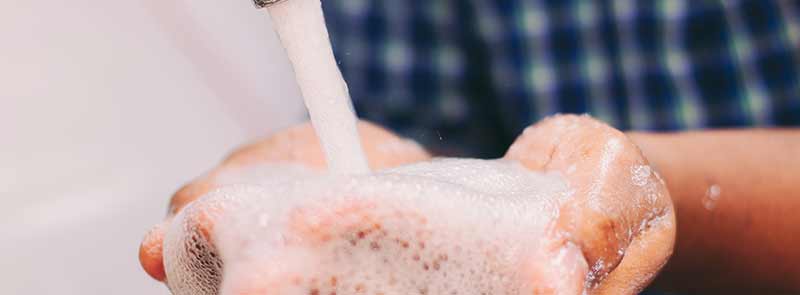Independent living skills are so important to develop, especially when you’re able to develop them when the stakes aren’t as high, rather than having to learn them as you go. Here’s a solid handful of independent living skills for teens that everyone should work towards mastering, or at the very least, having a basic grasp of.
Some teens will need to rely on these skills sooner than other teens will, just depending on their living and life situations. Some will have developed most or all of these skills before even becoming teenagers. Regardless of where anyone is at, these are all very important and useful things to work on.
Which Independent Living Skills are Most Important for Teens in 2022?
Here’s a good lust of seven categories of independent living skills for teenagers to work on. If someone has all of these things under control, they are already above-average in terms of managing their life and taking care of themself.
1. Personal Care Independent Living Skills for Teens

Being able to take care of yourself is an incredibly important skill for independent living for teens. This include things like hygiene and general self care for teens, but a lot of the other skills we’re about to look at would also arguably be able to fall into this category so think about personal care as a bit of a catch-all for any of the skills that might fall into the personal care category that don’t already fit into something else on this list.
Being able to take basic care of yourself gives you a solid baseline in life, and this includes a wide net of things. There will be times where your mood will be lower and you may neglect certain areas, that happens to everyone from time to time, but generally speaking you need to have at least a grasp on most of these things to live a balanced and comfortable life where you’re able to care for yourself. The specific balance you strike will vary from person to person, so it’s also about finding what works for you.
Examples of personal care independent living skills:
- Scheduling dental appointments, doctor check-ups, physicals, etc
- Personal hygiene
- Being mindful of mental health
- Sleeping well
- Grooming and basic appearance
2. Basic Finances
Having a grasp on your financial life also gives you a big leg-up. If you’re decent with money and understand how to utilize various banking products to your advantage, not to mention being able to create and maintain a budget and knowing how to safe wisely, you can end up far ahead of many people financially, even if they have a higher income than you.
Financial literacy is a great substitution for a higher income, you can do more with less when you know what to do with your money, which will in-turn help you grow that into more and more.
Basic financial literacy is something that is severely lacking, even thought there are high school courses that can cover it, a lot of this is the type of thing that teenagers learn at home from their parents, so if their parents have bad perspectives on money, that puts the teenager at a disadvantage but it can still be easily overcome by learning better ways to think about money.
The issue that many people run into is that the people who are teaching about money online when someone seeks out help and guidance don’t always have their audience’s best interests at heart, as a lot of financial influences will sell scammy advice or services that aren’t ideal – and the people buying it don’t know any better since they’re looking for help in the first place. If you find advice that’s setting off alarms or seems too good to be true, it is. Stick to legitimate and tried-and-true sources for basic financial advice, gain an understanding on your own, and go from there but always be very skeptical of advice you get when it comes to money, especially from people who want your money.
Examples of independent living skills for personal finance:
- Setting up a bank account
- Paying off higher-interest debts first
- Understanding good debt vs bad debt
- Having a long-term approach to your savings
- Having an emergency fund so you aren’t living paycheck to paycheck
3. Food Preparation, Nutrition, and Grocery Shopping
Having a decently balanced and healthy diet is one of the things that could easy fall into personal care, but frankly your overall eating and food preparation skills are important enough to justify their own category. On that same note, the shopping portion could probably also fall under personal finances, since grocery bills can eat up a huge portion of someone’s income if they aren’t careful and mindful about it, and even sometimes when they are.
If you’re used to your parents doing all of the shopping and cooking, why not start trying to take responsibility for at least one meal a day for yourself? That could mean preparing a few servings of it ahead of time for the week, or even making dinner for the family. It could mean shopping for the ingredients you need, or however you decide to slowly take steps towards being more responsible for the food you eat.
Learning tips and tricks to save money at the grocery store will stretch your food budget a lot further, and can be the difference between having to skip meals or not if you’re ever in a tight spot financially.
Examples of food and grocery living skills:
- Learning to use groceries before they spoil
- Shopping for deals and coupons, but only for stuff you need
- Learning to cook a few basic meals very well and efficiently for convenience
- Learning some more complex meals when you need to show off a bit
- Figuring out which types of diets and foods make you feel best
4. Laundry, Clothing, and Textiles
Are you starting to see the overlap between different categories? There are elements of taking care of your laundry, your clothing, your dish towels, your bath towels, that could also fall under personal care and arguably hygiene, but depending on where you live, this is either a relatively small task of taking your laundry your laundry room and doing a load every week or so, or it means hopping on a bus and riding across down to use a laundromat in more extreme cases.
So, if you have a laundry machine and a drier in your apartment building or in your suite/home, you’ve got this on easy mode. If you have to go to a laundromat either walking distance or having to use a vehicle to get there, this is going to be more of a chore, but still something that’s management. If you really find a hard time finding time for this, you could consider using a laundry service.
Paying for a service to handle something that takes a lot of effort, when you’d rather be working on other things, if you can afford to do that, doesn’t mean you lack living skills – it means you’re prioritizing when you’d like to be doing with your time at that given moment, and you’re still making sure that it’s handled and taking care of, so that’s a big win.
This category of living skills includes things like:
- Always having clean clothing to wear
- Being aware of your wardrobe and not wasting money on stuff you’ll only wear once
- Having clean towels, washing your sheets more than once a year, and even vacuum your carpets all fit into this grouping
5. Emergencies
Are you someone who rises to the occasion during an emergency, or do you freeze up? One of the ways to be prepared for emergencies is… well… to prepare for them, as silly as that sounds.
For example, having a fire extinguisher in your kitchen might not be the first thing you think of when you’re making a list to live on your own, but it could be the difference between a small blaze or a much more serious fire.
Or what about if the power goes out, do you know that everything in your freezer should be okay for about 24 hours, and everything in your fridge should be okay for around 4 hours without power? As long as you aren’t opening the fridge and freezer doors, that is.
It’s impossible to prepare for absolutely everything, but having plans in place for various types of emergencies is absolutely a very important set of independent living skills for teens to have.
Examples of emergencies you can prepare for:
- A plan in case of a fire
- Having numbers on hand of emergency plumbers, your building’s caretaker, etc
- Keeping your devices charged in case of a power outage
- Having a change of clothes, snacks, etc packed into a bag that you can easily grab in case of an emergency
- Having a first-aid kit
- A safety kit for your vehicle with blankets, food, candles, flares, and so on
6. Self-Actualization
This means, really simply put, to reach your potential. A valuable live skill to have is to strive to be the best version of yourself that you can be, without reason, while still taking into account other things you may value like comfort, downtime, and so on.
This could also include things like working and getting promotions and advancing your career or growing your business, obtaining mastery-level skills in the things that you enjoy doing, having a good balance in your life, and more.
Examples:
- Striving to do great at your hobbies
- Reading, learning, studying to become smarter and more informed
- Achieving fitness goals
Final Thoughts on Independent Living Skills for Teens

Chances are that you already know and practice a lot of the independent living skills for teens that are important to know. It’s impossible to list all of them, so even if you still have some stuff to work on, being aware of that already puts you in a great position to continue growing and gaining more independence.
